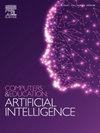教师在工作中的生成性人工智能自我效能感、重视与整合:考察工作资源与需求
Q1 Social Sciences
Computers and Education Artificial Intelligence
Pub Date : 2024-12-01
DOI:10.1016/j.caeai.2024.100333
引用次数: 0
摘要
自2022年底广泛发布以来,生成式人工智能(genAI)工具得到了迅速和广泛的接受,包括在教师中。我们调查了在教师的动机和参与中发挥作用的几个因素,以在教学和学习中利用基因人工智能。我们考察了在一个学期的课程中,情境因素(校内对应用基因ai的支持、时间压力、破坏性学生行为)作为动机(基因ai自我效能和基因ai价值)的预测因子,以及参与度(即基因ai融入教学相关工作和学生学习活动)的预测因子。在368名澳大利亚中小学教师中,我们的研究结果显示,基因支持与更高的基因自我效能感和基因价值相关。时间压力也与更大的基因价值有关,而破坏性学生行为与基因动机或参与变量无关。反过来,基因自我效能与两种类型的基因整合的更高水平有关。基因ai评价仅与教学相关工作中基因ai整合程度较高有关。我们的研究结果提供了支持genAI及其在澳大利亚教师中的应用的相关因素的知识,也与其他国家的教师相关。本文章由计算机程序翻译,如有差异,请以英文原文为准。
Teachers’ generative AI self-efficacy, valuing, and integration at work: Examining job resources and demands
Generative AI (genAI) tools have involved rapid and broad uptake since their wide release in late 2022, including among teachers. We investigated several factors that play a role in teachers’ motivation and engagement to harness genAI in teaching and learning. We examined contextual factors (in-school support to apply genAI, time pressure, disruptive student behavior) as predictors of motivation (genAI self-efficacy and genAI valuing) and, in turn, engagement (i.e., genAI integration in teaching-related work and student learning activities) over the course of one school term. Among 368 Australian primary and secondary school teachers, our findings revealed that genAI support was associated with greater genAI self-efficacy and genAI valuing. Time pressure was also linked with greater genAI valuing, whereas disruptive student behavior was not linked with the genAI motivation or engagement variables. In turn, genAI self-efficacy was linked with greater levels of both types of genAI integration. GenAI valuing was associated with greater genAI integration in teaching-related work only. Our results provide knowledge about factors relevant for supporting genAI and its application among teachers in Australia—and also hold relevance to teachers in other countries.
求助全文
通过发布文献求助,成功后即可免费获取论文全文。
去求助
来源期刊

Computers and Education Artificial Intelligence
Social Sciences-Education
CiteScore
16.80
自引率
0.00%
发文量
66
审稿时长
50 days
 求助内容:
求助内容: 应助结果提醒方式:
应助结果提醒方式:


